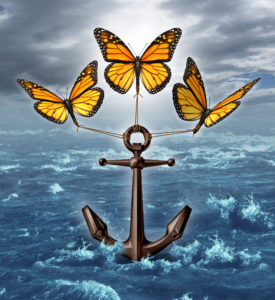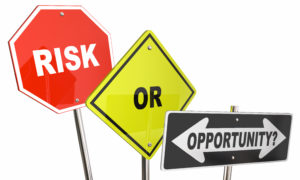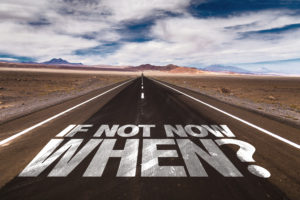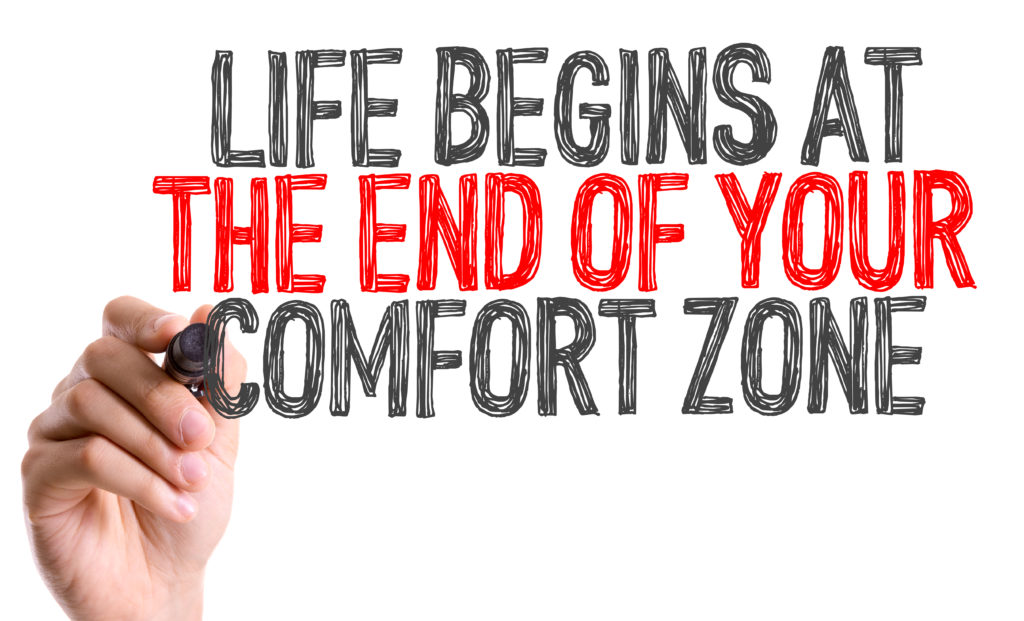Brené Brown says, “Leadership is not about titles or the corner office. It’s about the willingness to step up, put yourself out there, and lean into courage. The world is desperate for braver leaders. It’s time for all of us to step up.”
It takes courage and fearlessness to get honest with yourself and make the changes you need to be a better version of you. It’s hard to face our limitations, our feelings of inadequacy, and our beliefs that we are not good enough. To transform negativity, we need to get comfortable being uncomfortable. Self-awareness takes courage—the ability to face your fears and do it anyway—to be the strongest and best version of yourself.
It takes courage to confront your weaknesses, and determination to build strength in areas that are not a natural fit for you.
CHANGE IS NOT FOR THE FAINT OF HEART
 Limited thinking and confronting the behaviors that do not serve your best interests and undermine the quality of your work and your life.
Limited thinking and confronting the behaviors that do not serve your best interests and undermine the quality of your work and your life.
Letting go of what doesn’t serve you is a journey of discovery. Are you brave enough to ask, “Is my life working the way I want it to?”
We have all been wounded, during childhood, from failed relationships, or in toxic situations at work. We carry these wounds deep in our psyches and protect ourselves by walling off the hurt because we are afraid of getting hurt again. This shuts down your potential just waiting to be discovered. The good news is that we can heal these wounds and move on to better things, if we are courageous enough to face them.
It is not the strongest of species that survive, nor the most intelligent,
but the ones most responsive to change. –Charles Darwin
Dysfunction takes on many guises that can create a barrier between you and the success you desire. Identifying the root causes of previous hurt allows you to move past the excuses you use to avoid taking fearless actions. Revisiting old wounds, you recognize them for what they are: old history, something that happened in the past that trigger you today. You can address these wounds with courage and move on to something better.
Ask yourself: What do I need to do/think/be to change this attitude/habit/etcetera?
Change is the foundation for growth. Identifying what’s working and what’s not working in your life begins the change process. Once you know these areas, you can create goals and strategies that lead you in the direction you want to go.
The ability to take an honest and reflective look at your own life builds your fearlessness quotient. Research shows that when we see ourselves clearly, admit our strengths and weaknesses, and understand what needs to change, we are more confident and creative, and we make better decisions.
When you are self-aware, it increases your ability to communicate effectively and strengthens your relationships. Changing your thinking changes your behavior, benefiting not just you, but those you care for and lead.
If you take this journey to grow seriously and do the hard work of digging deeply to answer your own questions, a treasure trove of insights awaits you. In the hard work of asking powerful questions lie insights that will change your thinking, and ultimately, your life.
Progress is impossible without change, and those who cannot change their minds cannot change anything. –George Bernard Shaw
We all know what’s good for us. We know what we should be doing, could be doing, and are not doing. The tricky part is staying on task and sticking with it when it gets hard, because once you’re committed to change, you’re in. There is no turning back. You can’t just turn off the spigot and hope you can go back to being who you were. It’s a law of physics: Once the wheels are in motion, they stay in motion.
ARE YOU STRUGGLING WITH CHANGE?

The truth is uncertainty runs our lives every single day (not just in times of a pandemic), and we have no guarantees that today will end on a happy note. You can swing from elation to anger or complacency to fear in a heartbeat. Life itself is not guaranteed. But if the situation isn’t life threatening, you can find a way to move beyond the fears that hold you back by asking:
- What’s the worst thing that can happen if I don’t change?
- What stories do I tell myself that may not be true?
- What needs to change for things to be different?
- Who do I need to help me change my thinking or behavior?
Change is a challenge, so we often build resistance to it. Some people cling to the notion, “Better the devil I know than the one I don’t,” which indicates they like living in chaos and their own personal hell!
It can sometimes feel like you’re climbing a steep mountain when you’re going through change. I’ve hiked up many mountains throughout my life and equate change with these experiences. It takes a great deal of effort, but the views from the top are spectacular.
Growing up in poverty, I didn’t have many role models for success. The expectations were simple: I would work in the whiskey distillery or maybe in an office; I would marry and have children. My life was supposed to be only a little better than the people’s lives who raised me. I had other plans. I was motivated to change because I felt such strong discomfort with what I saw around me. I did my best to prove I was strong, capable, and smart, which resulted in a defiant nature and a lot of misdirected anger. If someone had asked me then if I was good enough, I would have said no. I was not good enough, which is why I worked so hard to prove myself to me.
Change has been the biggest driver of my life, invited or not! Taking risks has been a great teacher and a hard taskmaster. Change brought considerable fear. I found I needed curiosity and courage to face my truths and explore the possibilities that life could be different.
TAKING RISKS LEADS TO REWARDS

We take risks when we ask for something we want, when we push harder than we think we can, when we stand up for what we believe in. When you take a risk on someone or something, you show courage.
When you don’t step up because you’re fearful of losing something valuable, or you fear being rejected, humiliated, or failing at something that matters to you, you are effectively denying your strength and talents. You are refusing the gifts of experience and knowledge.
Risk could mean failure, and failure carries a heavy burden in our achievement-focused world. What if you could see failure simply as a choice or decision that didn’t work?
Taking the view that failure is necessary to learn means that failure is one more step toward success.
We forget that if we don’t fail, we won’t learn. When we regret our choices or create a mess, we often feel shame and rejection. It’s human to fail, but humiliation in the face of failure is a choice. Pick yourself up and start again. Yes, failure causes discomfort, but it is not fatal. You can learn from the experience!
The biggest failure is lacking the courage to try.
You are the leader of your own life. If you aspire to be a leader of others, you must first do your own work. Great leaders are not born, they are forged in the steel of experience, both positive and negative. Ultimately, brave leaders understand their impact on the world around them and choose to make change a positive experience for everyone.
BE COURAGEOUS; EVOLVE EVERY DAY

As leaders, we are frequently in the position of asking people to change, to improve their skills, move jobs, or turn on a dime. I find two simple questions effective in managing these transitions: “Who do you want to be when this is over?” and “How have your priorities changed?”
Most people know they can change or have changed in some ways, but they’re unsure about how these changes will impact their future. The best outcome is that they are prepared to think about things differently and willing to be open to possibilities.
To evolve, you must quietly, doggedly, simply allow little things to become big things.
You become a better version of yourself—the person you want to be—not through enormous lifestyle changes, but through slow, manageable tweaks over time. Personally evolving and achieving the life of your dreams requires commitment to a long game.
Choose to be a leader of tomorrow. Living in harmony with yourself and with those around you is not an impossibility. Many people act from unconscious impulses, not truly understanding the impact this has on the people around them. When you take a risk and challenge the status quo, you create a better you, a better team and a better world.
Believe you are stronger and more powerful than you think, in ways you can’t even imagine. You have the world in your hands: How will you contribute to it—for your own future? Choose to embrace change.
Jacqueline Wales is a motivational speaker, coach, and the author of The Fearless Factor @ Work, The Fearless Factor and other books. She believes in the power of fearlessness for creating the career and life you want.
I’d love to hear your comments and am happy to answer your questions!

